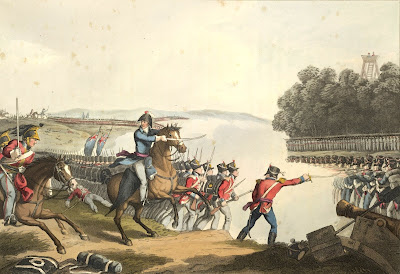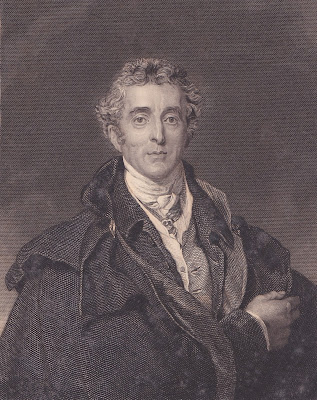A quick guide to the Napoleonic Wars and the Great War against France (1792-1815)
The Battle of Waterloo in The wars of Wellington, a narrative poem by Dr Syntax illustrated by W Heath and JC Stadler (1819)
Rachel writes: I don’t do military history, but as a Regency romance author, it’s impossible to ignore the war with France that raged during the opening years of the 19th century. If I want to make a soldier the hero of a Regency romance, I can’t afford to be completely ignorant about the Napoleonic Wars or was it the Peninsular War or the War of the Something-or-other Coalition…?
I confess to have got somewhat confused about the war with France, and in the name of historical accuracy, I would at least like to try to refer to the war correctly in my novels. Fortunately, my husband does like military history, and as he has a better understanding of the Great War with France, he wrote this blog to help me understand it. I thought others might find it helpful too.
The Great War against France
It’s really easy to get confused about the various wars with France that raged outside Regency-era England. It’s also easy to make silly mistakes in your writing, by using the wrong names for the various wars, campaigns and even battles.
This guide should help you make more sense of what was going on where, and what to call it.
Britain1 was at war with France for around 23 years—almost a quarter of a century. That’s most of Jane Austen’s adult life, from when she was a teenager to just two years before she died.
When people talk about the ‘war with France’ at this time, they could mean one of several different wars. They were all sparked by the French Revolution in 1789.

Napoleon Bonaparte from The Life of Napoleon, Emperor of the French by Sir Walter Scott (1871)
The Coalition Wars
The French Revolution shocked the rulers of other European countries. Relations between the revolutionaries in France and their neighbours broke down, initiating the first of several wars.
The first two Coalition Wars are also known as the French Revolutionary wars, because France was under a revolutionary government. The later Coalition Wars are part of the Napoleonic wars, because Napoleon Bonaparte governed France.
Coalition, meaning temporary alliance, is the name given to these. That’s because each war involved an alliance of different European nations.

Admiral Lord Nelson after the painting by John Hoppner in Miller's edition of Robert Southey's Life of Nelson (1896)
The French Revolutionary Wars
War of the First Coalition 1792–1797
France declared war on Austria in April 1792, and then on Britain and the Netherlands in February 1793.
Britain, the Netherlands, Spain, Prussia, the Holy Roman Empire (much of central Europe) and various smaller nations formed an alliance against France. Over time, different nations dropped out, making their own peace deals with France.
France captured the Netherlands and turned it into the Batavian Republic.
It included the only battle of the Revolutionary Wars fought in Britain, near Fishguard in Wales, where a small French invasion force was quickly defeated 22–24 February 1797.
The war ended in October 1797, although Britain did not make a peace treaty.
War of the Second Coalition 1798–1802
Britain, Russia, Portugal, the Holy Roman and Ottoman Empires, with other smaller countries, again took on France in a series of campaigns all over the continent, and in Egypt.
This war saw Nelson defeat a French fleet at the Battle of the Nile, on 1–2 August 1798.

The Battle of the Nile from Horatio Nelson and the Naval Supremacy of England by W Clark (1890)
Again, countries made their own peace with the French. Britain signed a peace treaty on 25 March 1802—the Treaty of Amiens.
End of the French Revolutionary Wars
The peace of March 1802 initiated the longest period of peace during the long years of war with France.
It also marks the end of the French Revolutionary wars. In 1799 Napoleon had effectively become ruler of France. In 1802 he became ruler for life, and in 1804 he crowned himself Emperor of France.
The peace lasted just 14 months, with Britain declaring war on France in May 1803. Britain faced France alone from 1803 to 1805, during which time the French threatened to launch an invasion.
The Napoleonic Wars
War of the Third Coalition 1805–1806
Britain, Russia, Sweden and the Holy Roman Empire, plus smaller states, allied against France. This war includes the Battle of Trafalgar on 21 October 1805, where Nelson defeated a French and Spanish fleet.

The Battle of Trafalgar from Horatio Nelson and the Naval Supremacy of England by W Clark (1890)
Just a few weeks later, on 2 December 1805, Napoleon crushed the armies of the Emperors of Russia and Austria at the battle of Austerlitz. The war effectively ended, although there was no peace agreement with Britain or Russia.
War of the Fourth Coalition 1806–1807
Britain, Prussia, Russia, Saxony and Sweden again allied themselves against France. French military successes soon reduced the alliance to Britain and Sweden. Russia swapped sides, declaring war on Britain.
With most of Europe under his control, Napoleon turned his eyes to Portugal, still an ally with Britain. In late 1807 he sent an army to capture its ports, thereby initiating the Peninsular Wars. These are separate from the Coalition Wars.

Napoleon Bonaparte from The Life of Napoleon Bonaparte by W Sloane (1896)
War of the Fifth Coalition 1809
Britain, Austria, Sardinia and Sicily joined forces, with Austria fighting back after its huge defeat at Austerlitz. This war saw the British launch the Walcheren campaign, in an attempt to support the Austrians by invading the Netherlands. It failed and the war ended with Austria’s defeat at Wagram.
War of the Sixth Coalition 1813–1814
Britain, Prussia, Austria, Russia, Spain, Portugal, Sweden and other smaller states formed an alliance that defeated Napoleon.
The allies took advantage of France being weakened by the failed invasion of Russia in 1812 and the ongoing Peninsular Wars.
The allies captured Paris on 31 March 1814 and Napoleon was sent into exile on the island of Elba.
War of the Seventh Coalition 1815
Also known as the Hundred Days, this was the final campaign of the Napoleonic Wars, prompted by Napoleon’s escape from exile on Elba in February 1815.
It led to Napoleon being defeated at the Battle of Waterloo on 18 June 1815and surrendering himself soon after, on 15 July 1815. He was sent into exile on the remote island of St Helena.

The Battle of Waterloo from Historic, military and naval anecdotes of particular incidents by E Orme & illustrated by JA Atkinson (1819)
A huge number of nations allied against France, including Britain, Prussia, Austria, the Netherlands, Russia, Portugal, Spain, Sweden and Switzerland.
The Peninsular War 1807–1814
This war overlapped with the fifth and sixth Coalition Wars. It saw Britain and Portugal, and later Spain, taking on the French. The name comes from its location on the Iberian Peninsula.
This war began with the Corunna campaign, with the British being driven out of Spain in early 1808. However, under Arthur Wellesley, later 1st Duke of Wellington, the British soon returned to Portugal. They launched a series of campaigns that eventually drove the French back to their own country.

Arthur Wellesley, 1st Duke of Wellington © Rachel Knowles - own collection
The French invasion of Russia 1812
The peace made between France and Russia in 1807, after the War of the Fourth Coalition, was breaking down. Napoleon launched a massive invasion of Russia, but it failed.
This war has other names. Napoleon himself called it the Second Polish War.
The failure of the invasion, and the decimation of the French army, helped encourage the formation of another alliance against France, leading to the War of the Sixth Coalition.
Andrew Knowles researches and writes about the late Georgian and Regency period. He’s also a freelance writer and editor for business. He lives with his wife Rachel, co-author of this blog, in the Dorset seaside town of Weymouth.
If you have enjoyed this blog and want to encourage us and help us to keep making our research freely available, please buy us a virtual cup of coffee by clicking the button below.
Note
I have used the term Britain throughout for simplicity. Until 1801, Britain was known as the Kingdom of Great Britain. From 1801 onwards, Ireland joined the union and Britain became known as the United Kingdom of Great Britain and Ireland.

